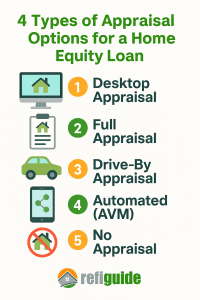When homeowners seek a home equity loan, lenders typically require an appraisal to determine the value of the property. Many homeowners want quick cash out with a home equity loan and the appraisal requirement can slow down the process. In this article, the RefiGuide will explore the various home equity loan appraisal options and what appraisers are looking for when they issue a report for the lender to underwrite an equity loan or HELOC.
Key Factors on an Appraisal for Home Equity Loan
This valuation plays a pivotal role in deciding the amount a borrower can access, ensuring that lenders mitigate financial risks and borrowers don’t overextend themselves financially.
Here’s a comprehensive look at what home equity loan appraisers assess during this process and how homeowners can prepare.
1. Property Condition and Structure
The primary aspect appraisers examine is the home’s overall condition. A well-maintained property with functional systems, such as HVAC, plumbing, and electrical, typically receives a higher valuation. Structural issues—like a leaky roof, foundation cracks, or outdated systems—can significantly decrease the appraised value, as these problems indicate potential repair costs for future buyers or lenders if foreclosure occurs.
2. Curb Appeal and Exterior Features
Appraisers place considerable importance on the exterior of the home, including landscaping, siding, and roofing. Curb appeal—the attractiveness of the house from the street—can positively influence the property’s value. A neat front yard, fresh paint, or trimmed bushes can create a favorable impression.
3. Comparable Sales (Comps) in the Area
Appraisers use the prices of recently sold, comparable properties within the same neighborhood as a benchmark. These “comps” help appraisers estimate the home’s fair market value. Factors such as size, location, and the number of bedrooms and bathrooms all come into play.
4. Home Upgrades and Renovations
Recent renovations—like a remodeled kitchen or updated bathrooms—can enhance the appraised value, particularly if they align with market trends. However, some types of appraisals, such as drive-by or automated valuation models (AVMs), may not account for these improvements unless documented explicitly.
Do You Need an Appraisal for a Home Equity Loan?
In most cases, an appraisal is typically required for an equity loan to safeguard the lender’s investment. Since the home equity loan is considered a second mortgage it is a higher risk for the lender because the lien is in second position on title. Since your home serves as collateral, the equity loan is classified as a secured mortgage ensuring that the lender can recover the loan amount if you default on payment.
However, there are a few banks and lenders that offer home equity loans without an appraisal. Of course the interest rates may be higher and the loan limits are lower with no appraisal home equity loan programs, but it worth considering if it makes sense for you.
What Are the Types of Appraisals Used for Home Equity Loans?
Banks, lenders and credit unions may have a wide variety of appraisal types for second mortgage transactions. Let’s break down the four most common appraisals.
Desktop Appraisal: Conducted remotely, this approach relies on data from public records and property listings. Though convenient, it may lack precision if the records are outdated. There are not that many lenders allowing a desktop appraisal on a home equity loan today.
Full Appraisal: This is the most comprehensive option, involving a detailed inspection of both the interior and exterior of the home. It typically provides the most accurate valuation but is time-consuming and costly. The full appraisal home equity loan typically take 1 to 3 weeks to process. In most cases, lenders will require a full URAR appraisal if you are applying for a bad-credit home equity loan.
Drive-By Appraisal: In this method, the appraiser evaluates only the exterior of the property, relying on public records and other available data for the interior details. While faster, it may not reflect recent interior upgrades. The drive-by appraisal for home equity loan financing is very popular.
Automated Valuation Model (AVM): This algorithm-based method uses historical sales data and property records. While it offers quick results, AVMs can miss the nuances of individual properties, like unique upgrades. The AVM home equity loan option has always been very popular with borrowers and lenders because it speeds the process up significantly because you do not have to wait for a licensed appraiser to inspect the house, take pictures, do their research on comparable sales and write up the report. However, the AVM home equity loan program has lower loan amount limits and sometimes higher interest rates.
How Appraisals Impact Home Equity Loan Amounts
The outcome of the appraisal directly influences the loan-to-value ratio or LTV. This LTV ratio compares the home’s appraised value to the outstanding mortgage balance.
Most banks allow borrowing up to 80% of the home’s equity, but their are 2nd mortgage lenders that offer home equity loans up to 90% with a good appraisal.
So in theory, the higher the value comes in on an appraisals the more borrowing potential becomes available.. Conversely, a low appraisal may limit the loan amount, requiring homeowners to adjust their borrowing plans.
How to Prepare for a Successful Home Equity Loan Appraisal
Homeowners can take steps to boost their property’s value before an appraisal. Here are a few strategies:
- Address Minor Repairs: Fixing leaky faucets, cracked tiles, or non-functioning light fixtures can make a positive difference.
- Enhance Curb Appeal: Tidying up the yard and painting the front door are small efforts with significant impact.
- Document Home Renovations: Prepare a list of recent improvements to share with the appraiser to ensure they are factored into the valuation.
- Research Comparable Sales: Knowing the value of similar properties in the area helps homeowners set realistic expectations.
The appraisal process is a crucial step in taking out an equity loan, as it determines how much equity homeowners can leverage. By understanding the different types of appraisals and preparing effectively, homeowners can optimize their property value and increase their borrowing potential. Paying attention to key factors like property condition, curb appeal, and recent upgrades ensures the best possible outcome. With adequate preparation, both lenders and borrowers benefit from accurate valuations, reducing financial risks and facilitating smoother loan processes.
How much does it cost for a home equity loan appraisal?
The lender will hire a professional appraiser to assess your home’s current market value. If your home has appreciated since you purchased it, this increase can enhance your available equity. The home equity loan appraisal costs generally range between $300 and $500 for a standard single-family home. However, larger properties or those requiring more detailed assessments may incur higher fees, typically between $500 and $795, reflecting the additional time and effort required for the evaluation.
Can I get a no appraisal home equity loan?
Yes, if you have a good credit score and a low loan to value, there are a few lenders offering home equity loans and HELOCs with no appraisal required. However, sometimes the no appraisal home equity loan will cause the borrower to higher mortgage rates and more restrictive loan limits. To ensure you’re getting the best equity loan or home equity line of credit, compare various borrowing options and assess how the overall costs stack up between them.
How long does an appraisal take for a home equity loan?
The entire home equity loan process can take anywhere from two to 8 weeks, depending on multiple factors, some within your control and others outside of it. The home appraisal process can take anywhere from a few days to a few weeks and since you are dealing with a 3rd-party, you can’t rush it. Being organized and well-prepared can help speed things up.
What documents are needed for home equity loans?
Your lender will typically request personal documents, including your current mortgage statement, mortgage note, and proof of income and employment information to underwrite your loan and assess your eligibility to finalize the loan process efficiently.
References
Consumer Financial Protection Bureau. (n.d.). What to expect from an appraisal.


